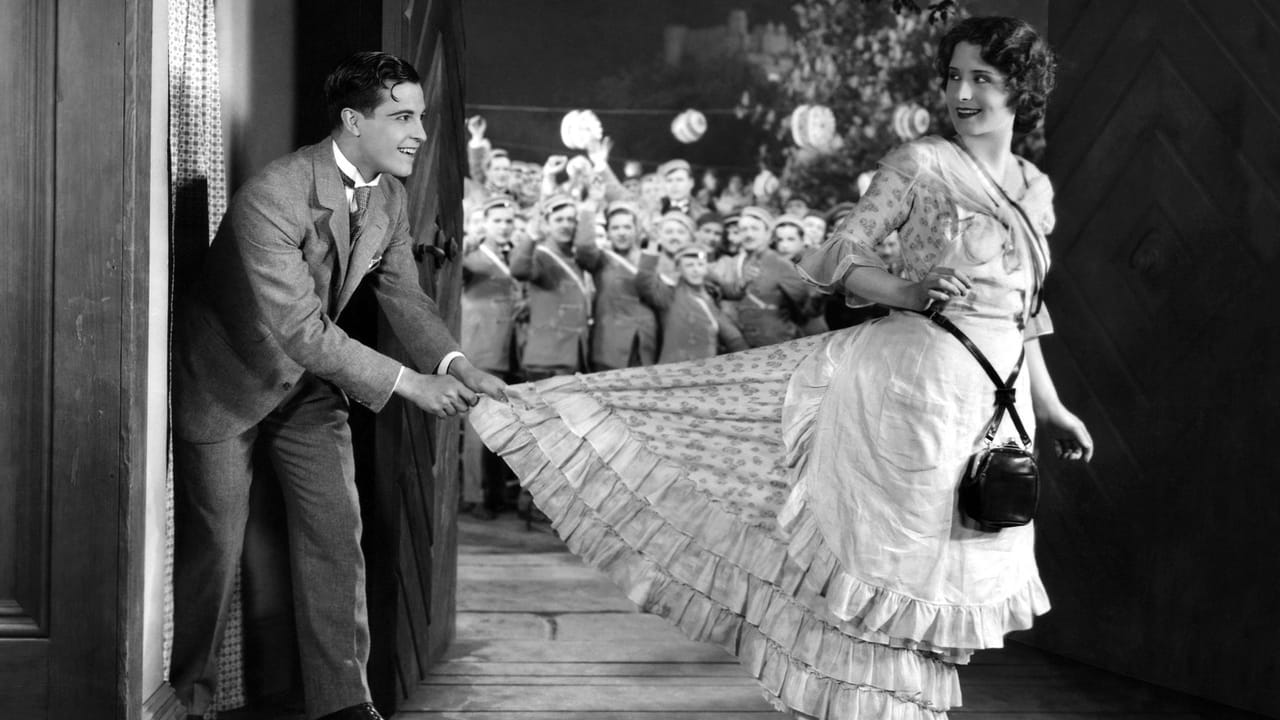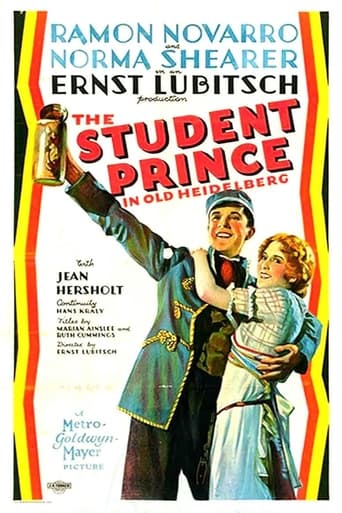

A lot of fun.
... View MoreThis is a tender, generous movie that likes its characters and presents them as real people, full of flaws and strengths.
... View MoreThis is a dark and sometimes deeply uncomfortable drama
... View MoreA clunky actioner with a handful of cool moments.
... View MoreI know, I know. This is a screen version of an old play. But having seen "The Student Prince" on screen in the '54 MGM version and on the stage, I missed the glorious Romberg score more than I thought I would. I even tried humming the songs at the right times to fit the movie. Romberg wrote the music in 1924, but this was still the silent era, although it is true that some musical films were accompanied in big cities by orchestras behind the screen, which is about as close as they could come way back then.This movie had the advantage of having Ernst Lubitsch as director, but the famed 'Lubitsch touch' is not readily apparent. It is a straight dramatic movie with a lot of heart and feeling and solid acting performances, especially Jean Hersholt as the prince's teacher and companion. Norma Shearer was as able and competent as always, while Ramon Novarro tended to overact.My overarching thought was how sad it is that the operetta has fallen out of favor since this was remade in 1954. That's an indictment of the cultural anemia that has inflicted our society since the middle of the last century. And sex, which drives stage and screen nowadays, is antithetical to the advancement of culture.
... View More*LOTS OF SPOILERS. A DOUBLE-WARNING, AS I DON'T WANT TO SPOIL THIS ABSOLUTE MASTERPIECE FOR YOU*When I'm writing about this one, I tend to run out of superlatives halfway through. It's the greatest film from one of Hollywood's greatest directors; a silent translation of a popular operetta, and as much fun, romance and heartache as most people can generally stand across an hour and three quarters.Ramon Novarro is the titular prince, the nephew of the king of Karlsburg, whose restrictive upbringing - one of "duty, obligation and loyalty" - goes out the window, however briefly, in a fug of love, friendship and beer, swirling (swilling?) across the old city of Heidelberg.The love - and the beer, for that matter - comes from an ethereal but down-to-earth, slightly cross-eyed barmaid (Norma Shearer): the guileless, glugging Kathi forever the high point of her screen achievements. Novarro himself wasn't blessed with the greatest range, but then you don't want J. Carrol Naish as your callow, conflicted young romantic, you want a sweet, sensitive, big-eyed kid with a seductive streak - and who more suitable than Novarro, a Latino sex symbol whose tenderness and vulnerability were all too real.You want your kindly professor, his sense of fun overriding his sense of decorum, played by someone with the chops and twinkle-in-the-eye of Jean Hersholt. And, of course, you want Lubitsch, the inimitable, irreplaceable Lubitsch, behind the camera, every scene handled with that "Lubitsch touch", every moment seeming to offer something new and extraordinary to bring a smile to your lips or a tear to your eye: Shearer checking out Novarro with absolutely no subtlety when they first meet, a garden-full of beer glasses raised with military precision, the look on the lead's face as his love interest downs an entire pint, the pair's spirited night-time excursion to the finest field in movies, and that heartbreaking return to Heidelberg, as heartfelt a paean to lost innocence and the youth that is never to return as the movies have ever served up.You can analyse the film a dozen different ways and it comes up faultless - from its abundance of visual metaphor, shifting perspectives used to illustrate the prince's changing moods, to the director's sparing use of intertitles, and the use of a groundbreaking shot in summation that predates The Long Good Friday by 53 years - but it all adds up to the same thing: a film for the ages, an emotionally overwhelming portrait of self-sacrifice, paradise lost and position found, of young lovers meeting like passing trains, together for a fleeting, shining moment, then torn away by "duty, obligation and loyalty". And it's all scored to perfection in the old Thames Silents version by the peerless Carl Davis."It must be wonderful to be a prince," muses one of the town kids, studying a portrait of Novarro. On this evidence, not so much, but then isn't life just about enjoying those perfect moments when they come? This film has more than almost any other.
... View MoreFrom time to time and in order to remember older better times, it is good to watch again those films that the European aristocracy and especially this German count likes most. Such is the case with "The Student Prince In Old Heidelberg", film directed by Herr Ernst Lubitsch during his Amerikan career.And this German count especially likes this silent film not only because in the oeuvre can be seen Teutonic aristocrats and even crowned kings, not to mention stiff laws about etiquette, uniforms with plenty of medals, tradition, obligation and, last but not least, royal duties. Another reason is because the film has style and classic elegance, primal emotions in motion, beautiful scenery and almost real decors, an impossible but idealistic true love story and memorable and skillful direction. There are a lot of superb silent moments, as for example, the first and unseen kiss in the garden, the night meadow scene, each and every shot starring the heartbreaking Dame Norma Shearer and a charming Herr Ramon Novarro. Besides those indispensable and unforgettable supporting silent actors, there is finally a magnificent, cruel, real and sorrowful ending."The Student Prince in Old Heidelberg" is a film about youthful dreams, the first painful love and the greatness and illness of falling in love. It's about the passing of time and those glorious memories of loves past that nobody can take away in spite, after all, of those unbearable and unjust social actions of people in high places against working class folk.Obviously this German count is talking about a classical, universal, wonderful masterpiece, a joy to the eye of a serious Teutonic aristocrat.Herr Graf Ferdinand Von Galitzien http://ferdinandvongalitzien.blogspot.com/
... View MoreI enjoyed this silent film version alot, it is 1000 times better than the 1950's musical version. Carl Davis' soundtrack for this one is passable, not one of his best. I kept wanting to hear Sigmund Romberg's melodies in the background for the soundtrack, too bad they couldn't get permission at the time, since the musical was introduced in 1924.
... View More